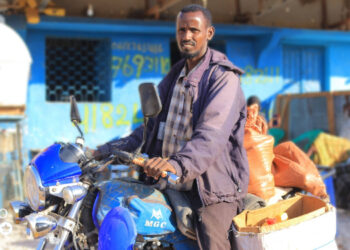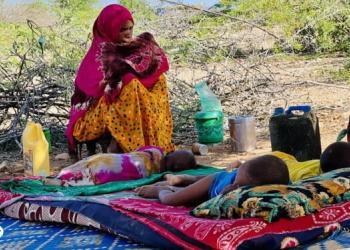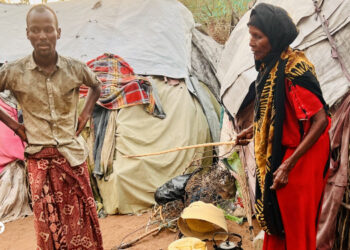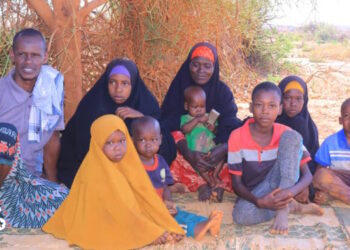(ERGO) – More than 100 families living in 10 displacement camps on the outskirts of Baidoa are successfully cultivating small gardens inside the camps, giving them food, income, and a better life.
Each family works on a plot of land 30-50 square metres in size, planting vegetables that are ready to harvest within three months. The produce has helped them overcome food shortages and even pay for their children’s schooling.
Abdullahi Aden Ali, 40, who has lived with his wife and six children in El-Baay camp in Baidoa for three years, says this is the best life he has known since their unfortunate displacement began.
From his 30-metre plot, he harvested tomatoes, cucumbers, lettuce, peppers, and carrots in June, earning $300 from sales in Baidoa market.
“Now we cook three meals a day – breakfast, lunch, and dinner. In the past this never happened. If we had food at night, there was no breakfast in the morning. If we had breakfast, we would wait for lunch and miss dinner. But now, my family eats three meals. We used to worry about how we would manage the daily hardships of life. All those burdens are now gone. I don’t feel any worries anymore; I feel happy that we can live on with hope!” Abdullahi told Radio Ergo’s local reporter.
Abdullahi used the first harvest to clear $50 in debts he owed for farm inputs and put $50 into savings. He paid $12 for two of his children to start Koranic classes in July. He has already replanted his plot and expects another harvest in September.
Abdullahi survived in the camp before on occasional porter work, with his family often going hungry.
A former farmer on a four-hectare rain-fed farm in his village of Baanow, Bay region, he fled to Baidoa in 2022 after repeated droughts and insecurity ruined his crops and livelihood. Now he accesses free water from a well in the camp to irrigate his vegetables.
“We ran from our farms because of drought and insecurity,” he said. “Here in the camp, we can irrigate the gardens with well water, so we don’t need to wait for rain. We can plant at any time, and that is a big advantage.”
Whilst the land they are living on belongs to local residents, who allow the displaced to use the land and shelter without paying rent, the displaced families have no security of tenure.
Nevertheless, Ali Mohamed Aden, a 43-year-old father of eight in Idaale camp, thought it was worth the effort and also began cultivating.
His first harvest in May earned him $400, and he has replanted for a second round. He saved part of the money, covered the family needs, and paid off a $40 debt.
“I saved two million Somali shillings ($50). That money is there for me as a safety net if I face any problem. The worry I used to feel was whether these children would grow up with hunger and hardship, whether we would survive or not. Now, thanks to God, that worry has disappeared, and I live in a calm state,” he said.
Ali’s 20-metre plot is now the sole source of livelihood for his family. He has enrolled two of his children in Koranic and secular education, paying $20 monthly. He dreams of leaving camp life and the hut made of sticks that his family has lived in since 2023.
“When we were displaced and arrived here, life was extremely difficult. People told us to go look for jobs in town, but there weren’t any. The camp was full of suffering. There was no education or anything. We realised that this life was not sustainable.
I borrowed seeds from a store and planted them on the farm. Now our life today is far better than before. My hope is to settle in Baidoa with my own house. I am appealing to the Baidoa authorities and aid agencies to support me in achieving this,” he said.
Ali used to farm on his own three hectares in Ruwey Gadude, 60 kilometres from Baidoa, but fled in 2023 after drought dried up his fields.
Mohamed Aden Ali, 33, in Tugey Dheere camp with his wife and four children, says his vegetable garden has solved his family’s biggest problems of food and education.
In June, he sold a harvest of tomatoes, cucumbers, lettuce, and peppers for $350. He used the money to pay for school for two of his children, to buy food, and purchase clothes for the younger ones.
“The profit encouraged me,” Mohamed said. “Before, my children never went to school. Now I pay $5 per child monthly for two of them. The others see their friends in uniform and say, ‘Father, we want to be like them.’ I buy them clothes too so they don’t feel left out.”
Mohamed had no capital to start farming, but other displaced farmers helped him secure seeds on credit, which he repaid from the harvest. He tills his 40-metre plot by hand with a hoe. Unlike many farmers across Somalia, he has not yet faced crop pests or had to buy pesticides.
Mohamed’s family used to farm three hectares in Bakal Eedan, Bay region, but left in early 2023 when drought made it impossible to continue. Although the garden plot is much smaller, irrigation from a camp well means he can produce food regularly.
This small-scale farming that started as an experiment by a few families is now spreading, giving others reason to believe they too can break the cycle of hunger and dependency.











